“There is no beauty without some strangeness.” ~Edgar Allan Poe
The master of the macabre, our beloved Edgar Allan Poe, here once more in beloved Baltimore. The National Edgar Allan Poe Theatre, in its first live-stage performance, has set up shop on the east side of Charm City, if perhaps just a little over the city’s borders into the county, to present Blood, Sweat, and Fears just in time for the pinnacle of spooky season. In a TheatreBloom exclusive interview, we’ve sat down and talked with company founder and project performer Alex Zavistovich about the project and just why it’s the perfect Poe experience for this Halloween season.
Thanks for giving us some of your time, Alex! Now you’ve been with The National Edgar Allan Poe Theatre since its inception, as one of the founders, and you mentioned this project— Blood, Sweat, and Fears— is a project that’s 15 years in the making, but what actually is this production? Is it a live staged reading of three of Poe’s pieces? Or is a live radio dramatization? Tell me about this production.
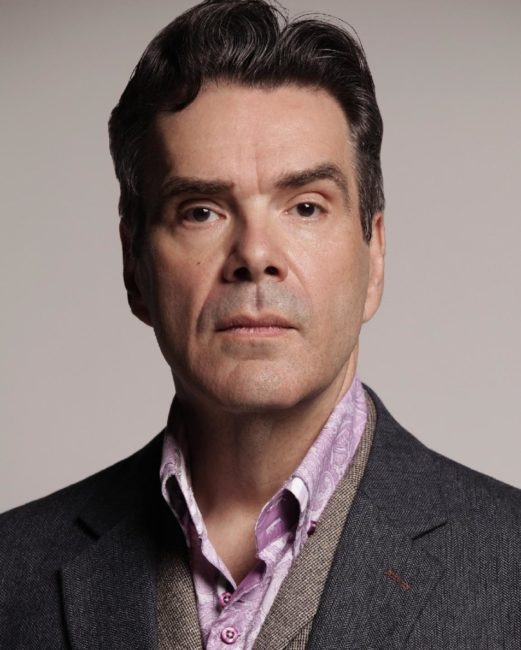
Alex Zavistovich: It is a cabaret style, re-adaptation of three of our radio drama adaptations, which are already streamable on National Public Radio, Audible, Amazon Music, and most other platforms. It features Berenice, which Poe wrote while he was in Baltimore, The Predicament, which is one of his comedies, and The Tell-Tale Heart, which is one of his greatest hits. We’ve put them all together interstitially with magic and some burlesque, well ‘light’ burlesque, nobody’s going to see a boob popping out, it’s more like vaudeville type movement with old songs from the American songbook classics. You have all of that and these three pieces all connected together and framed through the lens of a traveling sideshow of medical and phenomenological oddities.
It’s a traveling roadshow with a vaudeville feel to it, where I— as Professor Ambrose Quintillus Mallard am assisted by my long-time travelling companion and nurse Esme Perrine— present to you this traveling circus of sorts.
I’m sorry— but did you just tell me you’re playing ‘Dr. Quack?’
Alex: That’s actually part of the humor of it. There’s this running gag throughout the show where Esme will call me ‘mallard’ (sounding like a duck) just to get under my skin and I correct her, telling her the correct pronunciation. It’s funny.
Now these shows— Berenice, The Predicament, and The Tell-Tale Heart— already exist as radio dramas, and people can listen to our radio dramatization of them at any time.
And while that is a really fascinating option that people can and should do at some point, you want people to come and see these stories live on stage because…?
Alex: Because our goal has always been to have a physical venue. The mission of The National Edgar Allan Poe Theatre, overall, is to be the only theatre or at very least, the first theatre, that adapts the works of Poe for the stage, for broadcast, and in the schools for English literacy.
What is it about these three pieces that made you want to choose them out of all the other pieces that Edgar Allan Poe has written for Blood, Sweat, and Fears?
Alex: The structure very much follows what Molotov Theatre Group— the predecessor of The National Edgar Allan Poe Theatre— had structed as an evening of ‘Grand Guignol’ stories. In that old school of theatre, they did what they called “the hot & cold shower.” They would start with a suspenseful story, then they would put a comedy in the middle as a palate cleanser and to keep the audience a little off-guard, and then hit them hard with the finale.
We chose Berenice because it was one of the stories that Poe wrote here during his time in Baltimore. We chose The Predicament because, while Poe has a lot of humor in his work— even in “The Raven”— this one is a solid comedy which cannot be confused for anything else. I mean, it is a dark comedy, but it is definitely a comedy. And then we picked The Tell-Tale Heart because not only is it one of his greatest hits, but it’s also being taught in the Baltimore County Public School System eighth grade English curriculum.
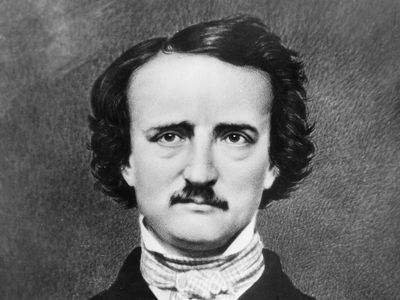
You’ve drawn these three short stories together, in the ‘hot & cold’ shower fashion of Grand Guignol, combined elements of the traveling road show, and magic, but I feel like we’re missing the biggest component of Edgar Allan Poe as Baltimore knows him. Where is “The Raven”?
Alex: “The Raven” actually factors into the finale of the piece, which is a real showpiece illusion demonstration. It’s hard to explain without going into a lot of technical detail. This particular spectacle is down by illusionists all over the world, so we’re really excited to include it with “The Raven” as a part of our production. It involves a table, six bags, all of which are empty except for one, which has a six-inch spike pointing upward inside of it. We invite a member of the audience up to the stage and have them start to read from “The Raven.” As they do, I pass my hand over each bag; when they stop reading, I stop my hand, and smash my hand down over the bag. It is really complicated to explain without seeing it…which would be another great reason for you to come and see it.
That sounds fascinating and an excellent reason for people to come and see Blood, Sweat, and Fears. What is your personal affinity with Edgar Allan Poe?
Alex: My very first experience in acting was in my very early days of junior high school. I was cast as the murderer in The Tell-Tale Heart. That begins my illustrious career of playing only villains and psychopaths. Once I did that, I became more interested in Poe, as one would, but I also became increasingly interested in Poe and horror. And then I became more interested in the theatrical productions of horror. There are very few true theatres of horror. In researching that, that’s when I became more familiar with Grand Guignol. We (as Molotov Theatre) arguably became more famous internationally with that than we were, even when we were in DC.
I think it’s more widely socially accepted, the “theatre of horror” or theatre of Grand Guignol, abroad— particular in Europe, because that’s where it originates. For some unfathomable reason, despite the niche popularity of horror-on-stage here in America, that type of theatrical movement has not gained the commercial successes of say splashy Broadway musicals or DIY-puppet theatre.
Alex: It’s funny because the fourth textbook in a series about The Grand Guignol (Grand Guingolesque: Classic and Contemporary Horror Theatre) has just been released, written by one of our Artistic Advisors, Professor Richard J. Hand of the University of East Anglia, and we are a full chapter. There’s a full chapter devoted to us— well, to Molotov but he does namecheck the fact that we now operate as The National Edgar Allan Poe Theatre— but that’s validation.
My hope now, as we refocus horror on Poe and specifically here in Baltimore, is that maybe this time around we’ll be as well known in our hometown as we are internationally.
What would you say— other than the logistics of finding the space and getting people to come out to live theatre in the space— has been your biggest challenge of making Blood, Sweat, and Fears your first live-stage performance with this company?
Alex: Getting the right technical team. The show is very music and projection heavy. It would be heavier with lighting in general but there are a limited number of illuminating instruments in the space we’re currently in. The lighting designer, Hailey Laroe has real chops and she’s also doing the projection design. Putting together a design team in general has been a little bit of a rude awakening for me. I was from the time, back in the Molotov days, where you could offer a designer a small stipend, and I’m learning now that that is not the case.
Lots of designers are expecting really big bucks for their work this time around. I actually had a really unpleasant experience in a Facebook group not so long ago, where I went seeking with the best of intentions, stating that the company was in need of a lighting designer and we had this low, four-figure stipend to pay, and I got flamed out of that space… to the extent that not only had they chased me out of their screaming that I was paying ‘slave wages’ but they followed me onto my own Facebook page to continue the argument. So that has been the biggest challenge. Companies that worked on a shoestring budget, now have to have a much longer shoestring. It’s interesting though, because in the community theatre scene, you can still find people who will do this type of work for the love of it.
We’ve been able to put together a very solid production team now though, largely through the efforts of Director Jay Brock. He found our costumer, Jacqui Maranville and our Sound Designer, Jay Shovan, and our Stage Manager Jackie Wilberton. In another world, we would have more time to get this on its feet, but I feel pretty good about what we’re about to open.
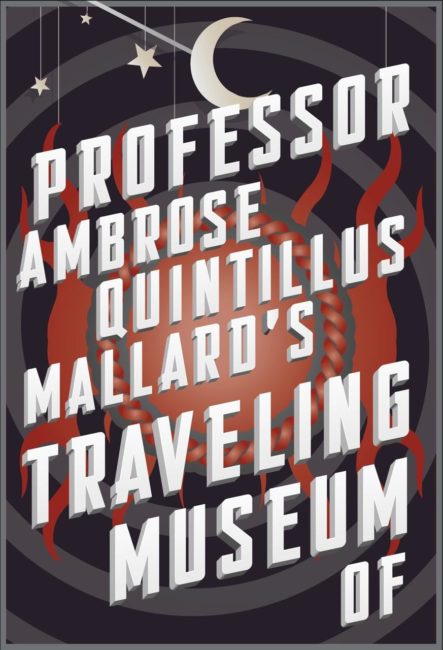
Is there a particular moment in the show, either in one of the three pieces, or in those magical moments that weave the three together, that really defines what the show means for you?
Alex: That’s a difficult question because I honestly feel like— and this is not going to be a popular response to be had from an artistic director— but if you come to the show, looking for a deeper meaning, you’ve come to the wrong place. It’s just entertainment. It’s a spectacle. The meaning, to me, is less about a moment in the show than it is about the way the show is structured. The notion of this cabaret-style approach, where all of these elements are woven together is definitely something that has not been seen before. Just getting it to that point is interesting. I love being able to do magic in what would otherwise be a ‘legit’ show. And not where magic occupies a moment in that show, you know, ‘ooh— did you see that little flash of something’, but where illusions are actually built into the show and incorporated into it. I’m very proud of that, probably because it allows me to nerd out on my passion and affinity for magic.
You could have a deeper interpretation from this experience. In psychology, there is this dynamic called ‘Folie à deux’, in relationships, where each person exacerbates the other person’s pathology. And you could build an argument for that. There are two principals in Berenice, two in The Predicament, and two in The Tell-Tale Heart. And then there’s my relationship with my assistant. In every case, we push each other’s buttons. If you were to get brainy and pointy-headed about it, you could talk about it from that perspective.
I find it fascinating that you immediately address it as ‘just a spectacle with no deeper meaning’ when the second-longest running musical in Broadway history— Andrew Lloyd Webber’s Cats, is arguably just a theatrical spectacle with no deeper meaning.
Alex: I will say, though, I think this show is a very Baltimore show, though.
Why?
Alex: Because it’s quirky and offbeat for its own sake. There is one moment— this is the one thing I’ll probably not going to spoil…but I’ll try to talk about it. There is a song called “When You’re Smiling” which precedes Berenice. And it turns into a little bit of a production number. Berenice is a story about a man that is obsessed with his wife-to-be’s teeth. He has monomania, this obsessive-compulsive disorder, and he’s focusing on her teeth. She gets progressively older and sicker, except for her teeth, which stay perfect. And he is horrified by her decline, except for her teeth, which he’s obsessed with. And I won’t give any more away, but we do “When You’re Smiling.” And at one point, we found these tooth puppets. They are just these gigantic puppets, that look like teeth. So all of the sudden, in the middle of it— there is a puppet production, staring teeth. The ideal reaction to that, from me, would be if you’re watching this, that you turn to the person you came with and say, “what the heck is going on here?” But also be okay with it. I love it because it is just so stupid and quirky. It has a very Baltimore flavor to it.
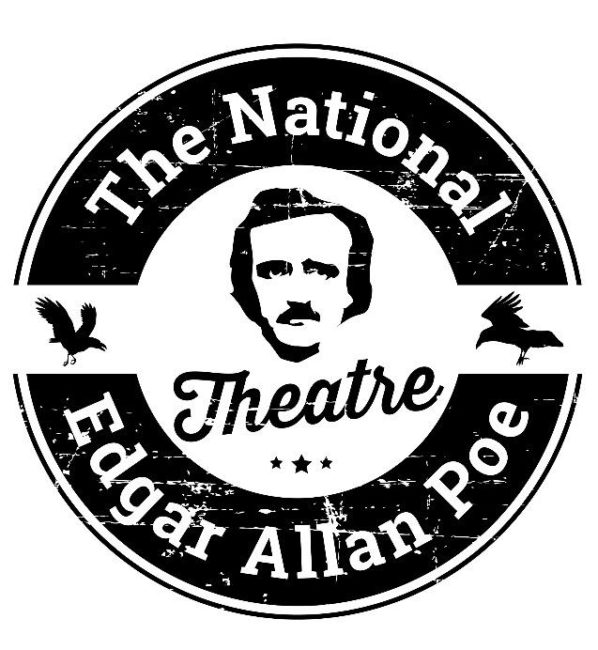
Other than the obvious ties of bringing Poe to Baltimore, what is the burning urge to be here? You’re the National Edgar Allan Poe Theatre, and a lot of other places— like Boston, somewhere in Virginia, and Philadelphia— want to lay claim to this American historical master of the macabre (even though Baltimore has his body and possession is 9/10ths of the law!) Why Baltimore?
Alex: Because I moved to Baltimore from DC. I’m a DC native. I’ve always loved Baltimore. In fact I’ve worked for three seasons with the late, lamented, Baltimore Shakespeare Festival. This is going back ten or twelve years or more ago. They used to do their winter shows at St. Mary’s church in Hampden and in the summer time they were out on the Evergreen field at Loyola. Tommy (one of Blood, Sweat, and Fears’ actors, B. Thomas Rinaldi) had done shows with them, Bruce Nelson (company member of Everyman Theatre) had worked with them, Jimi Kinstle was the artistic director there— they gave me my first big break when I got back into professional acting. It was a production of The Tempest. I’ve always had a soft spot in my heart for Baltimore. And I was kind of trapped in a house out in Prince George’s County that was underwater. It was too big for me, anyway. As soon as I was able to sell it, I started looking in Baltimore.
I didn’t want to move wholly away from horror theatre. And when we were Molotov Theatre, one of our biggest successes was with a show called Nightfall with Edgar Allan Poe. It was sold out from the opening night through its full run. And it was extremely well received. The very last show we did as Molotov was called Blood, Sweat, & Fears: A Grand Guignol Sick Cabaret. I started thinking, even at that time, we could take the elements of the Grand Guignol cabaret, apply it to Poe, and that’s how we got this. And now living in Baltimore, why not? When I started floating the idea around the city, everybody loved it— except they all said, “Who are you again?” Proving that our track record in Baltimore was non-existent, despite being well known internationally.
But you started off, after leaping from Molotov to Poe, as a radio-drama company?
Alex: We had to think about a way to develop our brand and our reputation in a way that wasn’t going to cause us to lose our shirt. And that’s how we started thinking about radio drama. Now I had a theatre company years and years ago— Lean & Hungry Theatre Company— that did Shakespeare adaptations as radio dramas on WAMU in Washington DC. It’s a tenth of the price to do a radio drama. We struck up a relationship— now as The National Edgar Allan Poe Theatre— with WYPR to start doing these radio drama adaptations, and then shortly after that, the pandemic hit. And all through the pandemic, we produced radio dramas. We did one show a month, even when a lot of other theatres were trying to figure out what to do to keep the lights on and pay the bills. I mean we still had to be creative, because studios were closed. We were doing a lot of single-scripted pieces, where I would do the whole thing, and I would have to record them in my closet. That’s what we did for some of our best known and more successful pieces. That’s how we started working internationally, with the University of Sterling, the University of East Anglia, we’ve been aired on the BBC…once again, international success? Local obscurity.
But ultimately when I think about the theatre’s mission— I refer to it as a three-legged stool, with Baltimore in mind— tourism, first and foremost. Then responsible development. I’d love to be able to have a physical venue where we can bring people from the community in to experience our work, especially underserved elements of the community, give them some sort of background and experience with something they have never had the opportunity to experience before. And finally, English literacy, especially in the underserved schools; that’s been fundamental for me. I learned acting in an English course in junior high school. My opinion has always been you can be the finest actor the world has ever known, but if you can’t read, eventually someone is going to hand you a script…and then what? So those have been the components of my goal the whole time, and I’m hoping that as things develop with the company I’ll actually be able to achieve all of those things to intersect.
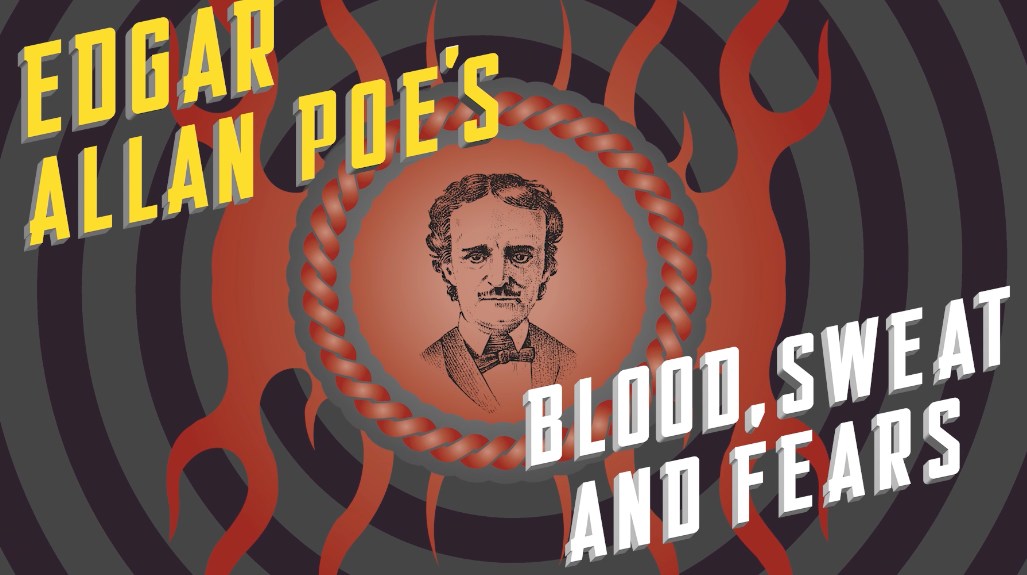
Why should people come out and see Blood, Sweat, and Fears?
Alex: Right now, people need a diversion and a distraction from the previous two years. This show is just weird fun. For better or for worse, I’ve noticed there has been a shift in theatre to really emphasizing meaning. And I understand some of that is really important, and I don’t want to deny that. But I also believe that there’s tremendous value to theatre as a cathartic source of enjoyment and fun. That’s what I hope people will take away from this. It’s 90 minutes of put the past behind you and just look at the weirdness and have fun. It’s genuinely fun.
If you had to sum up your Blood, Sweat, and Fears experience in just one word, what word would you use?
Alex: Overwhelming!
Blood, Sweat, and Fears plays October 14th through November 6th 2022 with The National Edgar Allan Poe Theatre at FPX Events— 7938 Eastern Avenue in the Dundalk neighborhood of Baltimore. Tickets are available at the door or in advance online.
